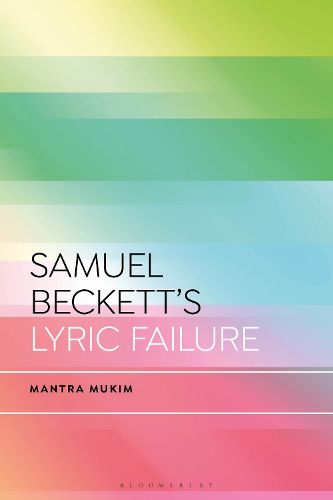Readings Newsletter
Become a Readings Member to make your shopping experience even easier.
Sign in or sign up for free!
You’re not far away from qualifying for FREE standard shipping within Australia
You’ve qualified for FREE standard shipping within Australia
The cart is loading…






Providing one of the first book-length accounts of Samuel Beckett's poetry, this work illustrates how Beckett's poetry, and its failures, reconfigure the lyric form. Reading Beckett alongside nineteenth and twentieth century European poets such as Hoelderlin, Mallarme, Rimbaud, Montale, and Apollinaire, the book situates failure in the triangulation of the lyric impulse, subjectivity, and the human voice.
Beckett, in his poems, employs lyric tactics that range from deixis, parataxis, and caesura to specific kinds of timbre, resonances, and punctuations. These tactics situate the poetic voice in the liminal points between life and death, event and non-event, beginning and ending, and more broadly, between expression and failure. The book frames these liminalities under the rubric of 'lyric failure'.
Moving beyond the usual comparisons with his prose and drama, the study highlights failure as a generative force that structures Beckett's anti-expressive poetics.
$9.00 standard shipping within Australia
FREE standard shipping within Australia for orders over $100.00
Express & International shipping calculated at checkout
Providing one of the first book-length accounts of Samuel Beckett's poetry, this work illustrates how Beckett's poetry, and its failures, reconfigure the lyric form. Reading Beckett alongside nineteenth and twentieth century European poets such as Hoelderlin, Mallarme, Rimbaud, Montale, and Apollinaire, the book situates failure in the triangulation of the lyric impulse, subjectivity, and the human voice.
Beckett, in his poems, employs lyric tactics that range from deixis, parataxis, and caesura to specific kinds of timbre, resonances, and punctuations. These tactics situate the poetic voice in the liminal points between life and death, event and non-event, beginning and ending, and more broadly, between expression and failure. The book frames these liminalities under the rubric of 'lyric failure'.
Moving beyond the usual comparisons with his prose and drama, the study highlights failure as a generative force that structures Beckett's anti-expressive poetics.